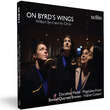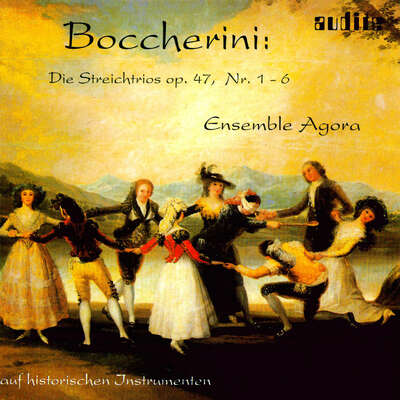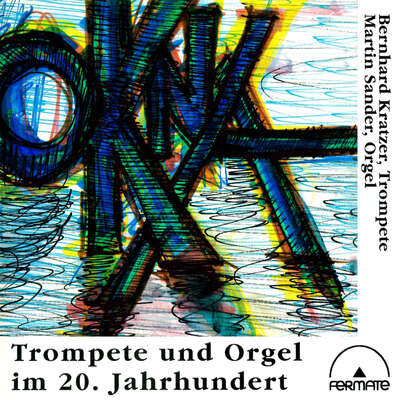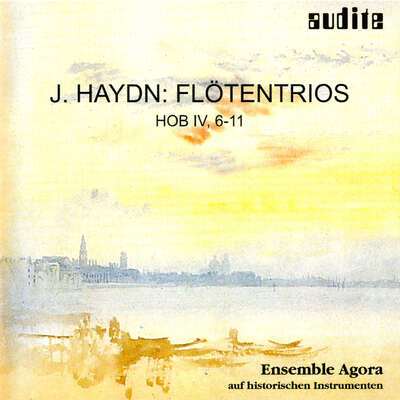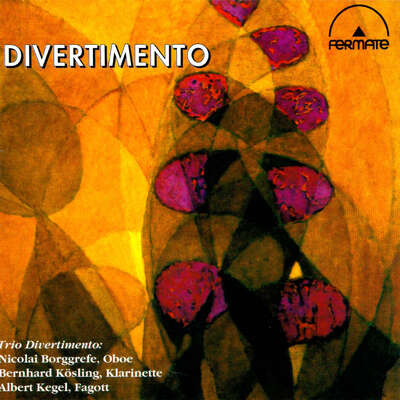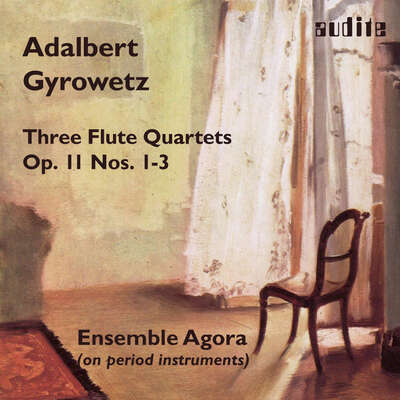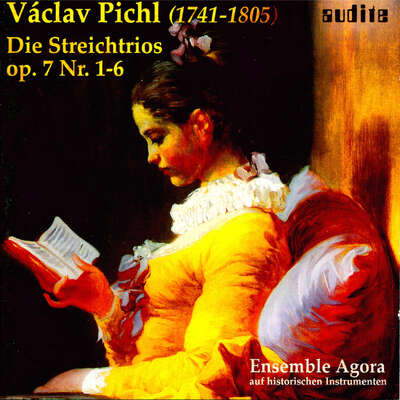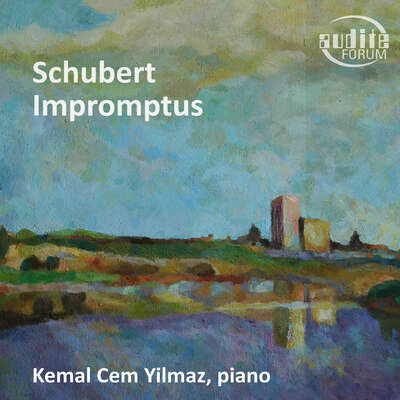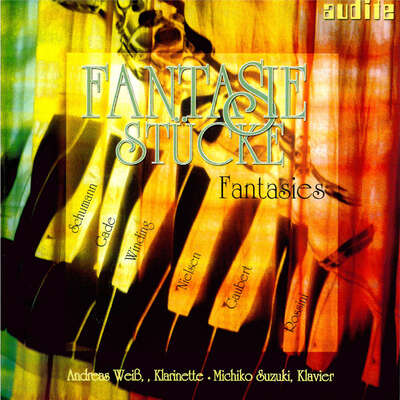
Eine musikalische Reise ins (nach-)elisabethanische England an der Schwelle von Renaissance zu Frühbarock: Consort Songs, Fantasien und Tänze von William Byrd und seinen Nachfolgern, farbenfroh inszeniert vom Boreas Quartett Bremen, dem Hathor Consort und den Sängerinnen Dorothee Mields und Magdalene Harer.mehr
"Dorothee Mields und Magdalene Harer singen [...] mit großer Wärme und betörender Schönheit. [...] Dieses Album [...] ist für den Jubilar Byrd (zumindest aus Deutschland) die beste Würdigung des Jahres!" (RBB Kulturradio)
Details
|
On Byrd's Wings
William Byrd and his Circle |
|
| Artikelnummer: | 97.818 |
|---|---|
| EAN-Code: | 4022143978189 |
| Preisgruppe: | BCA |
| Veröffentlichungsdatum: | 6. Oktober 2023 |
| Spielzeit: | 65 min. |
Zusatzmaterial
Informationen
Die Blütezeit der englischen Consortmusik fällt in den spannenden Stilwandel von musikalischer Renaissance zu Frühbarock zwischen 1580 und 1630. William Byrd und seine Nachfolger haben sie mit geistlichen und weltlichen Songs, Fantasien und Tänzen entscheidend mitgestaltet. Wie vielfältig und farbenfroh das Repertoire der Consortmusik ist, zeigt diese Produktion zum 400. Todestag William Byrds.
Einerseits beeindrucken die englischen Komponisten mit anspruchsvoller Satzkunst, andererseits greifen sie populäre Musik ihrer Zeit auf. So entstehen musikalische Stimmungsbilder, in denen sich die tiefe Melancholie, fromme Zuversicht und pralle Lebensfreude der Shakespeare-Zeit widerspiegeln.
Besprechungen
Blokfluitist | Jg. 16, Nr. 3 (September 2024) | Marjan Banis | 1. September 2024
De twee sopranen zingen overtuigend en sprankelend en maken de cd tot een levendig en aangenaam eerbetoon.Mehr lesen
Early Music Review | May 16th 2024 | Oscar Patton | 16. Mai 2024 | Quelle: https://doi.org/... Northern Souls
An illuminating contemporary illustration of English consort music is found in the beautifully produced album “On Byrd’s wings” (audite, issuedMehr lesen
ET SONA - HIFI & MÚSICA | Fernando Alday | 10. April 2024 | Quelle: https://www.et-s...
Audite, una de las casas discográficas con el mejor catálogo de música clásica ha tenido a bien presentarnos este material para suMehr lesen
William Byrd (1540 - 1623) fue un compositor de música en el periodo del renacimiento inglés. Se trató, sin duda, de uno de los compositores más grandes de la música inglesa de este periodo y su influencia se llegó a sentir en todo el continente europeo. Con una carrera que se aproximó a la corte de Isabel I, Byrd tuvo grandes oportunidades para consolidarse como compositor e intérprete y, más aún, para hacerse con un monopolio en la impresión de música que le permitió difundir y conservar su trabajo para la posteridad.
Es gracias a esta combinación de talento y fortuna que el día de hoy podemos disfrutar de una grabación excepcional, publicada por Audite, de musica que trasciende el periodo del renacimiento y nos adentra en el barroco. A efectos, el título de la obra hace referencia a las alas de un ave (por la traducción de Byrd), más nos indica que también estaremos acompañados de su "círculo", siendo este un conjunto de dignos sucesores, como Henry Lawes y Robert Johnson.
La música es interpretada por el Boreas Quartett Bremen, una agrupación especializada en la música de la "Consorte", un conjunto musical popularizado en la Inglaterra de los siglos 16 y 17. También es llamado así el estilo musical que se representaba por dichos conjuntos. También interpreta en el álbum el Hathor consort y las voces están a cargo de las Soprano Dorothee Mields y Magdalene Harer.
La música presenta un tono secular, que inmediatamente sumerge a quien la escucha en un ambiente lleno de una cautivante melodía y una atmósfera que, sin duda, transporta al periodo de la pieza musical.
La interpretación, tanto de las Soprano como de los conjuntos musicales es destacada y de excelente calidad. La grabación provee un escenario con amplitud y profundidad digno de una casa con el prestigio de Audite. La música es, en todo momento, agradable y cautivadora. Me ha agradado mucho el tema "A dialogue on a Kisse", que guarda un aire más moderno semejante a una balada. La interpretación lírica y las cuerdas le dan un aire cálido innegablemente agradable.
La grabación se encuentra disponible en formato físico como CD y como descarga digital en la página de Audite. Mi más profundo agradecimiento a Audite, que me ha facilitado el material para su escucha y disfrute. Por favor, visitar la página, ya que ofrecen, incluso, descargas gratuitas de excelente música instrumental y clásica para el deleite de todos los melómanos.
Concerto | Nr. 307 (1/2024) | 1. März 2024 Byrd beflügelt
Bis heute lassen sich dem elisabethanischen Repertoire von William Byrd,Mehr lesen
Windkanal | 4-2023 | Mirjam Schadendorf | 15. Dezember 2023
Gemeinsam mit den Sopranistinnen Dorothee Mields und Magdalena Harer haben sie einen Klang in die St. Cosmas- und Damian-Kirche von Lunsen gebracht, der seinesgleichen sucht. Mehr lesen
Singende Kirche - Zeitschrift für katholische Kirchenmusik | Jg. 70, Heft 4 (Dezember 2023) | Monika Fahrnberger | 1. Dezember 2023
Technische Perfektion an Stimme und Instrument paart sich hier mit großer Musizierfreude; die Einspielung ist eine gute Gelegenheit, die Musik von William Byrd und seinen Zeitgenossen kennen und lieben zu lernen.Mehr lesen
RBB Kulturradio | 23.11.2023 | Bernhard Schrammek | 23. November 2023 | Quelle: https://www.rbb-... BROADCAST: Consortlieder, geistliche Gesänge und Consortmusik
William Byrd war einer der bedeutendsten englischen Komponisten aller Zeiten und hat mit seinen Motetten, Consortwerken und Songs ganz entscheidendMehr lesen
Das klangliche Ergebnis ist grandios. Dorothee Mields und Magdalene Harer singen sowohl individuell als auch im Duett mit großer Wärme und betörender Schönheit. Das mit Blockflöten besetzte Boreas Quartett Bremen und das Hathor Consort mit Gamben sorgen für wohlige instrumentale Farben. Dieses Album bringt Licht in dunkle Novemberabende und ist für den Jubilar Byrd (zumindest aus Deutschland) die beste Würdigung des Jahres!
www.musicweb-international.com | OCTOBER 31, 2023 | Johan van Veen | 31. Oktober 2023 | Quelle: https://www.musi...
William Byrd died in 1623, which means that this year (2023) is Byrd year. Some composers take advantage of the commemoration of their birth or death,Mehr lesen
Never mind; a disc with music by Byrd is always welcome. It was for a reason that the poet Henry Peacham called him “our Phoenix Master”, as quoted in the booklet. What makes this disc especially attractive is that he is put into his historical context. His music is the core of the programme, but we also hear pieces by English contemporaries and composers of the next generation, some of whom may have been his pupils.
Consort music was not an exclusive English genre, but probably more popular in England than elsewhere, and also still fashionable when it had become obsolete on the mainland. It could be played with different combinations of instruments. One of them was a group of instruments of the same family, such as viols or recorders. Instruments of different kinds could also be mixed; such a formation is known as ‘broken consort’. In this programme both kinds of consort can be heard. Most pieces are played by the Boreas Quartett Bremen, a group of four recorder players. A few items are performed by the Hathor Consort, here consisting of four players of viols, from treble to bass. As the track-list shows, some pieces are in more than four parts, which means that there the two ensembles are mixed in different combinations of viols and recorders. One such piece is the Fantasia à 6. Fantasias were very popular in England, often called fancies. They were so typical of the traditional English music that after the Restoration Charles II, having come from exile in France where he had heard the latest music, expressed “an utter detestation of Fancys”, as the author Roger North stated. Another genre that was much revered was the In nomine, based upon the Sarum antiphon Gloria tibi Trinitas as it was used by John Taverner as cantus firmus in his mass of the same name. Lastly, a substantial part of the consort repertoire consists of dances; the combination of pavan and galliard was the most common. Here we get such a pair from the pen of Thomas Tomkins. In the track-list in the booklet the galliard is omitted.
In the late 16th and early 17th centuries numerous songs were written and published in England. The best-known today are those by John Dowland, but many of his colleagues also contributed to the genre. One of them was Thomas Campion, who is represented here with The Fairie Queene Proserpina. Here the voice is accompanied by a lute. It was also a possibility to add a viola da gamba. That is the case in Henry Lawes’s A Dialogue on a Kisse. A special genre was the consort song, in which a consort accompanies one or several voices. Strictly speaking that is not the correct description. In fact, the voice is part of the consort; it is consort music in which one or some of the parts are sung, usually the upper part. This means that the balance has to be right: the singer is not a soloist. Such pieces are mostly performed with a consort of viols, but this disc shows that it is perfectly possible to use recorders instead. The voices of Dorothee Mields and Magdalene Harer are such that they blend perfectly with the recorders. There is one piece where the performers have taken some freedom which does not really convince. Byrd’s O Lord, how vain comprises three stanzas which end with a chorus, which is performed here by the two sopranos and recorders, which is a rather unlucky decision on the part of the performers. The disc ends with an anthem by Orlando Gibbons, which is scored for five to six voices with consort; here only the two upper voices are sung, the others are performed instrumentally.
One may wonder why a piece from a collection with the German title Taffel-Consort is included here. The composer was English; little is known about the formative years of Thomas Simpson. The first documented evidence of his existence is a list of musicians at the court of the Elector Palatine in Heidelberg in 1608. He worked for most of his life in Germany and spent his last years in Copenhagen. All his extant music was published in Germany, and the Taffel-Consort was the last, printed in 1621, comprising fifty consort pieces. They include a basso continuo part which has been omitted here. From Peter Holman’s article on Simpson in New Grove I conclude that these pieces seem to be intended for strings, including violins. Here they are played on recorders, and these suit the four selected dances pretty well.
The Boreas Quartett Bremen is a fine ensemble; I first heard it on a disc with consort music by Christopher Tye (cpo, 2015) and more recently in a programme with music at the Court of Margaret of Austria (review). I enjoyed both very much, and that is the case here again. Their technically impeccable and lively playing is nice to listen to. In the latter programme they collaborated with Dorothee Mields, and that is a winning combination. I have to say, though, that I regret the slight vibrato in her voice. Her colleage Magdalene Harer is nearly free from that. Their voices blend well in the pieces for two voices. For those who don’t know them: in such pieces Mields is on the left side of the sound spectrum, Harer on the right. As I already mentioned, the balance between the voices and the instruments is just right. The collaboration with the Hathor Consort is a nice addition: some pieces are played by viols alone, but in most cases members of the two ensembles join in a ‘broken consort’, and that works very well.
This disc is an interesting and musically captivating contribution to the Byrd commemoration.
Neue Musikzeitung | 16. Oktober 2023 | Dr. Michael Kube | 16. Oktober 2023 | Quelle: https://hoerbar.... HörBar
[...] äußerst lebendig, mitunter auch witzig-spritzig.Mehr lesen
www.pizzicato.lu | 05/10/2023 | Norbert Tischer | 5. Oktober 2023 | Quelle: https://www.pizz... Consort-Musik von Byrd und seinem Zirkel
Dieses Projekt lädt ein zu einer musikalischen Reise ins England an der Schwelle von Renaissance zu Frühbarock, mit Consort Songs, Fantasien undMehr lesen
Das geschieht überaus kunstvoll, mit einem sehr homogenen und zugleich doch in Stimmen wie im Instrumentalensemble konturierten Vortrag. Das Boreas Quartett brilliert einmal mehr mit tollen Darbietungen.
Der kultivierte Gesang von Dorothee Mields und Magdalena Harer ist darstellerisch beseelt und intensiv im Ausdruck und das alles macht dieses Programm zum kurzweiligen Hörabenteuer.
English translation:
This project invites you to a musical journey to England on the threshold from Renaissance to early Baroque, with consort songs, fantasies and dances by William Byrd and his successors.
This is done with great artistry, with a very homogeneous and yet contoured performance in voices as well as in the instrumental ensemble. The Boreas Quartet once again shines with great performances.
The cultivated singing of Dorothee Mields and Magdalena Harer is both inspired and intense in expression, making this program an entertaining listening adventure.
Deutschlandfunk | Montag, 02.10.2023, "Tonart", 1:05 Uhr | Haino Rindler | 2. Oktober 2023 | Quelle: https://www.deut... BROADCAST
Der 400. Todestag des Komponisten William Byrd war der Anlass für das Album On Byrd’s Wings, doch der Grund dafür war ein anderer: die Musik undMehr lesen
SWR | So., 1.10.2023, 16:05 Uhr, SWR2 Alte Musik | Doris Blaich | 1. Oktober 2023 | Quelle: https://www.swr.... BROADCAST
Jetzt aber fliegen wir erstmal eine Runde mit William Byrd. „On Byrds Wings“, auf Byrds Flügeln heißt eine neue CD mit Musik aus dem goldenenMehr lesen
MUSIK
„Have mercy upon me“, ein Bußpsalm von William Byrd, gesungen von Dorothee Mields und Magdalene Harer mit innigem und schlichtem Ausdruck. Ich finde das wunderschön, wie sich diese beiden Stimmen umranken und wie sie sich mit den Instrumenten mischen, den Blockflöten des Boreas Quartett Bremen und dem Hathor Consort mit seinen Gamben und der Laute. Das ist einfach super zusammen geatmet und phrasiert, die Farben sind wunderschön abgestimmt, die Intonation ist so sauber, dass manche Akkorde regelrecht leuchten, aber eben niemals grell, sondern einfach durchsichtig.
1623 ist William Byrd gestorben, vor 400 Jahren also. Byrd, der Zeitgenosse von Shakespeare und einer der großen Komponisten seiner Epoche. Er schrieb Musik für alle Lebenslagen, für Tasteninstrumente, weltliche Lieder und Instrumentalwerke und sehr viel geistliche Musik, sowohl für den anglikanischen Gottesdienst, als auch für den römisch-katholischen. Denn Byrd war Katholik und litt im protestantischen England sein Leben lang unter Diskriminierung. Trotzdem hat ihm Königin Elisabeth I 1575 ein ziemlich exklusives Privileg für den Notendruck verliehen. „William Byrd and his Circle“ ist der Untertitel und das Programm der CD. Sie gibt einen Einblick in die häusliche englische Musikkultur. Jeder bessere Haushalt hatte damals ein Sortiment von Gamben im Musikschrank, meistens sechs Instrumente in unterschiedlicher Größe von Sopran bis zum Bass. Eine Laute und ein paar Blockflöten gehörten ebenfalls zur Grundausstattung. So konnte man sich abends mit Nachbarn und Freunden treffen, zusammen Musik machen und dann noch ein schönes Essen genießen. Byrd und seine Zeitgenossen haben genau für diese Besetzungen eine Fülle von Werken geschrieben, mal mit, mal ohne Singstimmen. Und genau diese Musikkultur spiegelt diese neue CD. Byrds Werke stehen im Zentrum. Drumherum versammeln sich Henry Lawes, Thomas Campion, Robert Johnson, Thomas Tomkins, Thomas Simpson und Orlando Gibbons. Geschmackvoll kombinieren die Musikerinnen und Musiker dabei die unterschiedlichen Genres und Klangfarben. Hören wir noch ein bisschen weiter in Byrds Musikerzirkel. Ein Tanz der Satyrn von Robert Johnson. Die Satyrn, diese geisterhaften Mischwesen aus Mensch und Ziegenbock springen hier wild zwischen den unterschiedlichen Taktarten Zweier und Dreier hin und her. Satyrs` Dance von Robert Johnson, gespielt von den Blockflöten des Boreas Quartett Bremen.
MUSIK
„On Byrds Wings – William Byrd and his Circle“ heißt diese schöne und facettenreiche neue CD mit Musik aus dem England um 1600. Bei einigen Stücken sind die beiden Sopranistinnen Dorothee Mields und Magdalene Harer beteiligt. Beide zählen zu den herausragenden Sängerinnen in der Alte Musik Szene. Und es ist wirklich ein Fest, wie sie gemeinsam Musik machen mit diesen großartigen Instrumentalisten des Hathor und des Boreas Consorts. Die CD ist beim Label audite herausgekommen, wie immer bei diesem Label sehr gut aufgenommen und das Booklet ist informativ und sorgfältig gestaltet. Zwei Weihnachtsstücke von Byrd und Gibbons sind auch dabei, für mich echte Entdeckungen, die senden wir später mal in der Weihnachtszeit.
Radio Klassik Stephansdom | 16. September 2023, 07:30 Uhr | Michael Gmasz | 16. September 2023 | Quelle: https://radiokla... BROADCAST: CD DER WOCHE
die neue CD On Byrd’s Wings [...] hat mich von den ersten Klängen an gefesselt und gepackt. [...] die beiden wunderbaren Sopranstimmen von Dorothee Mields und Magdalene Harer [...] laufen vor allem in den Duetten zu wahrer Hochform auf.Mehr lesen
Sunday Times | 05.11.2023 | Quelle: https://www.thet...
An immensely rewarding exploration of the richness of English consort musicMehr lesen
